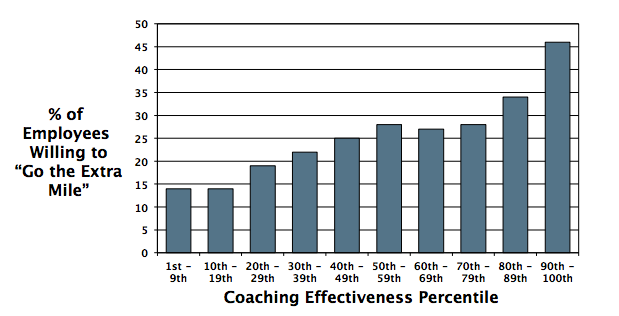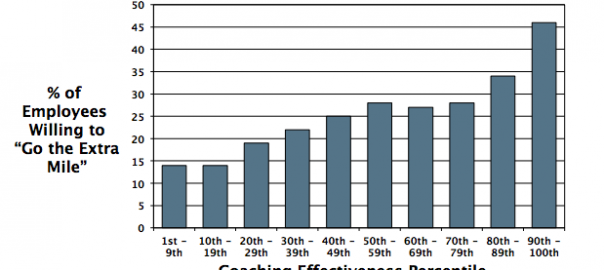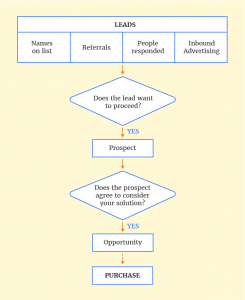Coaching is unlocking a person’s potential to maximize their own performance . It’s helping them to learn rather than teaching them. – Author, Tim Gallwey
Performance coaching levels the playing field. The concept is defined as an ongoing process which helps build and maintain effective employee and supervisory relationships. By being an employee advocate, managers develop, encourage and build their employees into more engaged, better performing players on the team. These following 5 payoffs solidify the need and importance performance coaching plays at work.
1. Increased Productivity
A recent leadership report from Dr. Jack Zenger entitled “How Developing a Coaching Culture Pays Off” hones in on the effects true performance coaching can have. The graph shows the percentage of employees “willing to go the extra mile” in relation to their coaches’ effectiveness. The least effective coaches have less than 15% of their direct reports respond positively to this question.

A commitment to performance coaching isn’t a zero sum game. Better coaches, in turn, have better performance for their underlings. The workforce agrees. 60% of employees feel their relationship with their employer positively impacts their focus or productivity at work.
2. Employee Engagement
80% of HR pros say that employee engagement is an important area of focus for their organization yet 49.5% of employees are “not engaged” and 16.5% are “actively disengaged.” Direct managers, higher-ups and leadership have the power to create a buy-in to the work of the subjects. Even with little one-on-one feedback sessions, an email with an accolade, or a verbal praise, managers have the ability to frame the outlook of a job.
“37% of employees say their boss failed to give credit when credit was due. And this matters because if employees feel like their recognition is being stolen by their manager, they won’t be incentivized to work as hard. In turn if you do give them credit, they will be more motivated.” – Maren Hogan ( @marenhogan), CEO of Red Branch Media
3. Increased Retention Rates
Ever heard the phrase, “employees quit their bosses, not the job?” Of course you have. And repeated reports tend to find the same result. 75% of people voluntarily leaving jobs don’t quit their jobs; they quit their bosses.
The messages managers send through their actions, their decisions and their interaction with their staff can leave a huge mark on the company. The 3,000 ft view, is that turnover is a management issue.
4. Employee Development Pipeline
Performance coaching allows the manager to sit down with his or her employees to train, develop and grow. 68% of workers say training and development is the most important workplace policy. Keeping trained staff in the company for longer periods of time solidifies the leadership pipeline. Train your staff up, and watch them train the newbies.
“ Selecting the right person for the right job is the largest part of coaching.” – Phil Crosby
5. Managerial Performance
What happens to the team, either negatively or positively, reflects back on the coach. Take football… lose even a couple of big games when stakes are high, and your job is on the chopping block. Alternatively, a winning team’s success can be chocked up to a quality coach at the helm.
It’s the same thing in the workplace – it can be a cycle. When the team does well, the manager can be invigorated and motivated to keep the good flow coming. Which in turn will ramp up the productivity, engagement and performance of the staff….which shoots back to the leader….you get the gist.
The Pathway To Better Performance
We’ve addressed the benefits performance coaching can have to the team, the company and even the coach. By understanding the issues at hand, whether it be retention numbers, substandard performance or a lackluster engagement feel, small steps can be taken by managers to continue to grow the organization.
Business & Finance Articles on Business 2 Community
“Coaching is the replacement for the annual performance review. In fact, the lack of coaching skill is the REASON we have performance reviews.” – Kris Dunn (@kris_dunn), HR Influencer Extraordinaire
(89)






